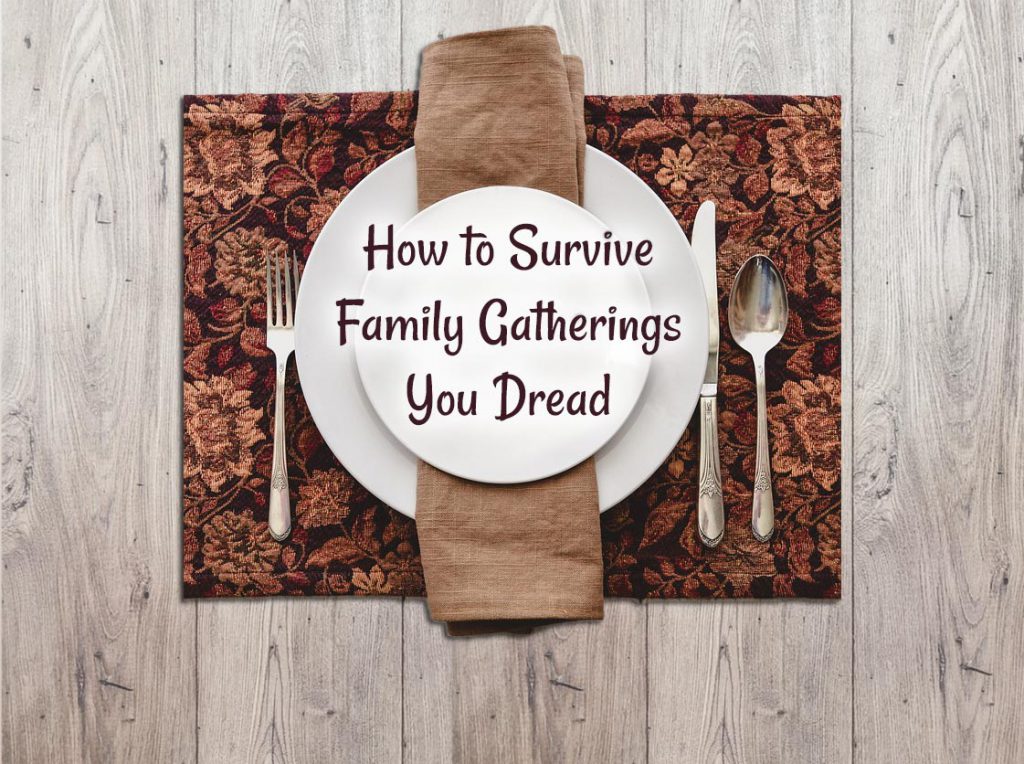How do you feel about the holiday season? Many of us have emerged from dysfunctional, chemically altered, abusive, negligent or toxic family relationships. Merely the thought of facing these people again can set off a firestorm of triggers.
You may feel guilty about avoiding family during holidays. You may dread family gatherings. You may decide to go, but you feel uncomfortable at family get-togethers. You worry you won’t be your best self. A part of you wants to celebrate peace, joy, and happiness anyway. If the holidays are your personal kryptonite, how are you going to take good care of yourself?
Here are three important tips for your emotional safety and wellbeing.
1) Give yourself options, including opting out
“You’re not obligated to sacrifice yourself to ‘keep the peace’ or make others happy at the expense of your own sanity and well-being,” writes poet, author and men’s life coach Rick Belden. “It’s not your job to help maintain the illusion of a happy, healthy family.”
If you are recovering from a troubled family life, you know the tremendous work you have invested in rebuilding your sense of self. You’ve grown. Old roles such as peacemaker, fixer, dumping ground, scapegoat, punching bag or cook and bottle washer don’t suit you anymore. The holidays do not require you to fall back into these roles.
Celebrate the freedom within yourself to walk away, mentally, emotionally, or even physically, from old systems that hurt you. You have a right to care for yourself. You get to define who you are this holiday and every day. If caring for yourself means stepping back from people or settings that don’t feel good, so be it. You don’t need anyone’s permission to avoid being where you don’t feel safe, accepted or seen.
2) Let go of trying to control
Of course we want this year to be different. This time, we’ll finally feel the love we’ve been craving. We’ll look for new tenderness from mom or dad, hoping they will own up at last to the pain they have caused. We dare dream that for one day, everyone will put aside their bickering, binge drinking and other toxic patterns.
What happens when they don’t? It’s not wrong to hope for repairs to old wounds. But you have no control over others. Hoping (again) they will control their craziness disempowers you.
Look where you have control: your inner life. As an adult, you control your choice of resources for your well-being.
“If soul-searching has shown you that your mother’s opinions are wrong for you—as are your grandfather’s bigotry, your sister’s new religion, and your cousin’s alcoholism—hold that truth in your heart, whether or not your family members validate it,” writes Martha Beck for Oprah.com. “If you’ve been deeply wounded by your family, you can stop trying to control them by accepting full responsibility for your healing.”
3) Be there for yourself (find a way)
A holiday puts the focus on family. If that’s extremely stressful to you, it’s probably just as hard for everybody else.
Do you want more than to suffer through it, tolerate, or merely survive? You don’t have to abandon hope of finding joy today. In an excerpt from a guide to adult child abuse survivors, Grace Davis reminds us we have the power of choice. We can choose to act, rather than forsake ourselves to our circumstances at any time:
DO NOT ABANDON YOURSELF.
I can’t say this enough – do not abandon yourself.
You were abandoned as a child. You did not deserve this. No child deserves this. So, as adults, we take care of ourselves as if we are our own precious child.
The pain of growing up with trauma may not fully go away. But a practice of denying pain can stop. Much healing happens in learning to feel it, express it and resolve it in safer, more inter-connected ways. You can care for yourself so you get through it, and enjoy life anyway. Healing means learning new skills, such as self-care, vulnerability and self-compassion.
A holiday is a great time to prepare emotional resources you may need. One such resource is a self-compassion break, an exercise developed by researcher and author Dr. Kristin Neff.
“This is a moment of suffering,” the break begins. It continues:
Suffering is a part of life.
May I be kind to myself.
May I give myself the compassion I need.
Suffering is part of our common humanity. Rather than hate it, resist it, or begrudge others for triggering it, what if happens if we accept it?
No one wants to go into the holiday season bracing for pain, suffering and stress. They will happen anyway.
Showing yourself compassion for the times you may not be feeling your best is one of the most wonderful gifts you can give yourself. And as you practice, you may find joy in offering compassion to others in your life this holiday as well.


